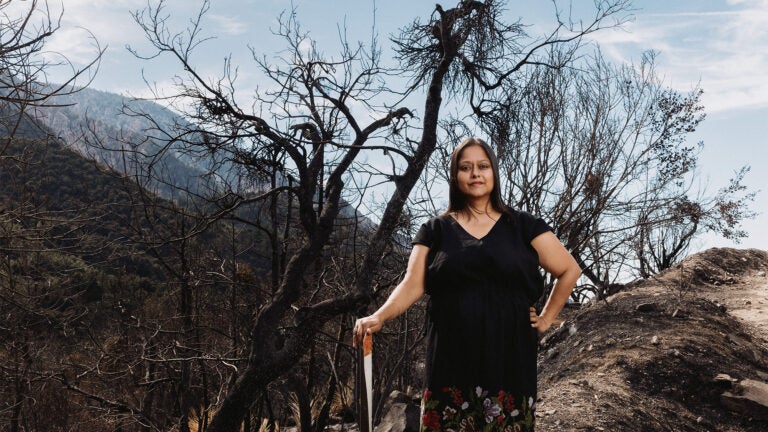
She’s Got You Covered: Meet the Professor Working to Improve California’s Fire Insurance Industry
Monalisa Chatterjee has spent her career studying how humans adapt to extreme climate events such as tropical cyclones, urban floods and droughts. In recent years, the associate professor and graduate director of environmental studies has turned her focus to a climate trend that’s especially urgent in California: wildfires.
Over the last two decades, the number of large wildfires in California has surged, causing tragic loss of lives, homes, trees and wildlife. California has risen to the challenge, allocating billions to the Department of Forestry and Fire Protection (Cal Fire) and emerging as a leader in emergency response.
“The state has invested heavily in training its wildfire fighters and equipping them properly,” says Chatterjee. “California is also working with Indigenous communities to incorporate traditional forest management practices, like controlled burns, to reduce excess fuels.”
Chatterjee has identified a critical gap in wildfire management that remains despite these advances: the state’s fire insurance market. “When it comes to wildfires, insurance is failing to protect Californians from risk,” she says.
The devastating wildfires of 2017 and 2018 wiped out decades of profits for home insurance companies in California. In the aftermath, premiums have soared, forcing many homeowners to forego fire insurance and leaving them vulnerable to financial disaster. Many insurers have refused to renew policies for homes in high-risk areas, while others have exited the state altogether.
Chatterjee notes that the state-run FAIR Plan, which offers basic fire insurance to those unable to obtain it elsewhere, is only a temporary stopgap solution to the state’s insurance woes, due to its minimal coverage and rising costs.
“Insurance policies are designed with a rigid, one-size-fits-all risk assessment model,” she says. “We need to develop a model that accounts for the unique risks associated with wildfires.”
Chatterjee began scrutinizing the insurance issue while developing materials for her Environmental Risk Analysis course, a requirement for USC Dornsife’s Environmental Studies and Environmental Data Science master’s degree programs, the latter offered jointly with the USC Viterbi School of Engineering. With help from graduate student researchers, she is navigating the complexities of creating a new model by analyzing large datasets and talking to communities in high-risk areas. For example, she met with residents of a Santa Monica community who had pooled money to purchase their own secondhand fire truck and install water tanks for wildfire preparedness.
Such cooperative actions can drive insurance innovation, helping to mitigate property loss and reduce the economic risks borne by insurance companies.
“Wildfires present an excellent opportunity to develop a collective approach to risk management,” says Chatterjee. “We can incentivize people to make neighborhood improvements that make it less likely a wildfire will spread, which in turn will reduce insurance premiums and make policies more affordable.”
The clock is ticking; as climate change leads to hotter, drier conditions and human development continues to encroach on forested areas, the wildfire risk keeps growing.
Yet, Chatterjee remains pragmatic. “We have to find a way of coexisting with fires,” she says.
Burning Questions
While earning her master’s degree in environmental data science at USC Dornsife and the USC Viterbi School of Engineering, Aurora Massari ’24 worked as a research assistant for the wildfire insurance project led by Monalisa Chatterjee.

